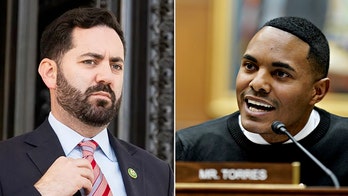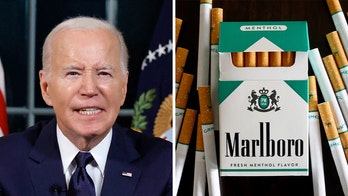Rough stuff at the budget conference Monday.
Normally, there's little drama at these things, when House and Senate negotiators get together to hammer out the blueprint for the year's spending bills. But this year, Congressional Democrats are holding a large hammer above the heads of Republicans, a tool the GOP first used back in the '80s and both parties used many times since, and that's a budgetary tool known as "reconciliation," a mechanism that precludes any Senate filibuster.
Democrats, backed by President Obama, are holding out the possibility of using reconciliation for a massive health care reform effort, as well as for education funding, and the former has Republicans up in arms.
As Democrats worked to meet a Wednesday deadline, which marks Obama's hundredth day in office, negotiations over the $3.6 trillion budget, with about $1 trillion of discretionary spending, Monday were beset with recriminations about about who is to blame for the current economic crisis, reconciliation, and more.
Sen. Judd Gregg, R-NH, top Republican on the Budget Committee, set the tone. He accused Democrats of learning a lot from the current crisis about how to manage the budget, and then this zinger, "They learned how to do accounting through the AIG method," Gregg said, referring to troubled insurance giant that nearly toppled the global economy last year. He called the budget "dishonest" and "a fraud" for not accounting for health care reform costs, certain tax breaks, and a Medicare fix for participating doctors, masking, he said, hundreds of billions of dollars.
Gregg also took great exception the specter of reconciliation, saying the tactic, originally designed to reduce deficits, was never intended to create massive new programs, like the $643 billion health care plan envisioned by the White House.
Senate Budget Committee Chairman Kent Conrad, D-ND, fired back with a reminder that Republicans, led by Gregg, pushed through 2001 Bush tax cuts using reconciliation. He noted, as well, that President Clinton was able to get major welfare reform through, in concert with Republicans, using reconciliation.
But Cong. Paul Ryan, R-WI, continued the assault on the Democrats' budget. "This isn't an attempt at having fair-minded negotiations...This is having reconciliation so you can drive through whatever you want. How is that fair?" the congressman asked, adding, "This is the most irresponsible budget I've seen since I've been reading budgets...It's astounding to me that we would pervert & distort the budget process like this."
Conrad threw the accusation back at Ryan and his party, saying, "If there was ever a case of cooking the books, you guys did it."
Cong. Rosa DeLauro, D-CT, came to Conrad's rescue, saying to Republicans, with a wag of the finger, "Shame on you, for looking at what you did there," referring to the recession.
Conrad called the Republicans' legacy "a disaster" and said, "You turned this economy into the worst recession since the Great Depression."
Reaizing the "rhetoric is getting a little heated," Conrad attempted to calm the room, saying, "I don't believe that reconciliation will be used to write health care. It is there as an insurance policy. I really sincerely believe it won't be used."
And Republicans can take heart in one part of the budget. Conrad announced that the budget would state explicitly that reconciliation will not be used on climate change. Some had thought Democrats might try to use a back door in the budget to create cap and trade as a way to pay for health care reform, but the chairman said, "You have the House and Senate, backed by the President, signed up to this. It's not going to happen."




